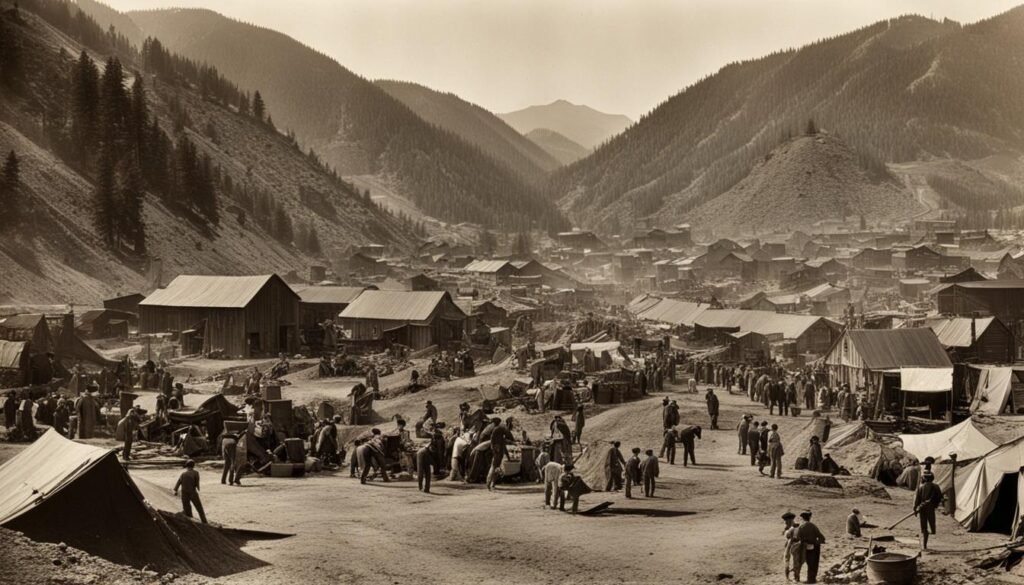Are you interested in a career that combines your love for geography with exciting job prospects? Look no further than geographer jobs! In this article, I will explore the wide range of career opportunities available to geographers in various sectors, including education, corporations, government, and non-profit associations.
A degree in geography equips individuals with valuable skills in Geographic Information Systems (GIS), remote sensing, and quantitative analyses. Geographers are in high demand for their expertise in spatial interactions and human-environmental connections. With a strong foundation in critical thinking, problem-solving, and global awareness, a career as a geographer is an ideal choice for those interested in working with spatial data and understanding the world around us.
Key Takeaways:
- Geographer jobs offer a wide range of career opportunities in various sectors.
- A degree in geography equips individuals with valuable skills in GIS, remote sensing, and quantitative analyses.
- Geographers are in high demand for their expertise in spatial interactions and human-environmental connections.
- Private sector and government organizations provide job opportunities for geographers.
- Advanced education may be required for certain geographer careers.
Private Sector Jobs in Geography
When it comes to geography careers, the private sector offers a range of exciting job opportunities. Geographers can find employment in consulting firms, environmental and engineering companies, and non-profit organizations that specialize in land management and conservation. As a geographer, you’ll have the chance to use your skills in urban and physical geography to make a real impact in these sectors.
Some popular job titles in the private sector include:
- Data Technician
- Geographic Information System (GIS) Specialist
- Survey Technician
- Communications and Advancement Manager
- Research Associate
These roles involve tasks such as data analysis, map creation, and project management. The demand for geospatial analysts, GIS technicians, and cartographers is on the rise, making it an excellent time to pursue a career in geography.
If you’re looking for private sector job openings in the field of geography, websites like ESRI, Indeed, and Idealist are valuable resources to explore. These platforms often feature job postings for urban geography jobs, physical geography jobs, geospatial analyst positions, GIS technician jobs, and cartographer job vacancies, among others.
Remember to check these websites regularly to stay updated on the latest job opportunities in the private sector.

Government and Public Sector Jobs in Geography
As a geographer, there are numerous employment opportunities in government and public sector organizations at the federal, state, and local levels. This sector offers a range of rewarding careers that allow you to make a meaningful impact on society while utilizing your expertise in spatial analysis and data management.
Job opportunities in government and public sector organizations include:
- Geographer
- GIS Specialist/Technician/Cartographer
- Remote Sensing Specialist
- GIS Coordinator
- Physical Scientist
- Research Associate
- Parks and Rec Planner
- Town Planner
- Defense Mitigation Consultant
- Urban and Regional Planner
These positions allow you to apply your knowledge and skills in geospatial analysis, geographical information systems (GIS), remote sensing, and urban planning. Whether you’re working on urban development projects, conducting environmental assessments, or analyzing spatial data for policy planning, these careers offer a diverse range of opportunities to contribute to the betterment of communities.
To find government and public sector job openings, valuable resources include websites like USAJOBS.gov and specific government agency websites. These platforms regularly post job vacancies and provide information about the application process and requirements.

Jobs Requiring Additional Education in Geography
While many geographer jobs can be pursued with a bachelor’s degree, there are also career paths that require additional education and specialized training. These advanced roles open up new opportunities and allow individuals to delve deeper into their passion for geography. Here are some geographer jobs that may require further education:
K-12 Social Studies Teachers
Aspiring educators can pursue a career as a K-12 social studies teacher, sharing their knowledge and love for geography with students at the elementary, middle, or high school level. Additional education, such as a teaching certification or a Master of Education degree, is typically required to become a licensed teacher.
College-Level Instructors
For those interested in teaching geography at the college level, pursuing a graduate degree, such as a Master of Arts or a Doctorate in Geography, is often necessary. This higher level of education equips individuals with the expertise and credentials to teach at the postsecondary level.
Academic Geographers
Academic geographers work in research institutions or universities, conducting in-depth studies and contributing to ongoing geographic research. These positions typically require advanced degrees, such as a Master of Arts or a Doctorate in Geography, and specialization in a particular area of interest.
Research Associates
Research associates collaborate with other geographers or professionals in related fields to conduct research studies, analyze data, and contribute to the development of geographical knowledge. These positions often require a graduate degree and may involve working in academic institutions, research organizations, or government agencies.
Landscape Architects
Landscape architects use their knowledge of geography, environmental science, and design principles to create aesthetically pleasing and functional outdoor spaces. To become a licensed landscape architect, individuals typically need to complete a professional degree program in landscape architecture and gain practical experience through internships or apprenticeships.
Spatial Scientists
Spatial scientists specialize in analyzing and interpreting spatial data, using advanced techniques such as Geographic Information Systems (GIS) and remote sensing. These positions often require a graduate degree in geography, geomatics, or a related field, as well as strong analytical skills and proficiency in data analysis software.
By pursuing additional education and specialized training, geographers can unlock a wider range of career possibilities in various industries. Graduate and professional programs, such as a Master of Arts in Geography, Master’s in Urban Planning, or Master’s in Sustainability or Environment, provide opportunities for geographers to deepen their expertise and enhance their skills.
Explore these advanced geographer jobs and take your passion for geography to new heights.
Conclusion
A career in geographer jobs opens up a world of exciting opportunities in both the private and public sectors. Geographers possess valuable skills in spatial analysis, data management, and critical thinking, making them highly sought after by companies and organizations in various industries. With job opportunities available in the private sector, government agencies, and the option to pursue advanced degrees, geography careers offer a fulfilling path for individuals passionate about making a meaningful impact.
Whether you’re interested in working for geography companies, conducting research, or contributing to urban planning and environmental conservation, geographer jobs provide the platform to explore diverse career paths. The demand for geographers continues to grow as businesses and governments strive to understand and manage the complex relationships between people and their environment.
If you have a passion for geography and are looking for a rewarding career, seize the job opportunities for geographers today. Start by developing your skills in spatial analysis, geographic information systems (GIS), and data interpretation. Network with professionals in the field and stay updated on the latest trends and advancements in geography. By leveraging your knowledge and expertise, you can forge a successful and impactful career as a geographer.
FAQ
What career opportunities are available in geographer jobs?
Geographer jobs offer a wide range of career opportunities in various sectors such as education, corporations, government, and non-profit associations.
What skills do geographers possess?
Geographers possess valuable skills in Geographic Information Systems (GIS), remote sensing, and quantitative analyses, as well as critical thinking, problem-solving, and global awareness.
Where can I find private sector job opportunities for geographers?
Private sector job opportunities for geographers can be found in consulting firms, environmental/engineering companies, and non-profit organizations specializing in land management and conservation. Websites like ESRI, Indeed, and Idealist are great resources for finding job openings in the private sector.
What job opportunities are available in government and public sector organizations?
Geographers can find employment in government and public sector organizations at the federal, state, and local levels. Job opportunities in this sector include positions such as Geographer, GIS Specialist/Technician/Cartographer, Remote Sensing Specialist, GIS Coordinator, Physical Scientist, Research Associate, Parks and Rec Planner, Town Planner, Defense Mitigation Consultant, and Urban and Regional Planner.
What additional education may be required for certain geographer jobs?
Some geographer jobs may require additional education beyond a bachelor’s degree. These include careers as K-12 social studies teachers, college-level instructors, academic geographers, research associates, landscape architects, and spatial scientists. Various universities and colleges offer graduate and professional programs, such as a Master of Arts in Geography, Master’s in Urban Planning, and Master’s in Sustainability or Environment, to further enhance the knowledge and skills of geographers.
Are there job opportunities for geographers in the field of geomatics engineering and surveying?
Yes, geographers can pursue careers as geomatics engineers or land surveyors, which may require additional specialized education and training.
What makes geographer jobs a fulfilling career path?
Geographer jobs offer a multitude of exciting opportunities in both the private and public sectors. Geographers possess valuable skills in spatial analysis, data management, and critical thinking, making them highly sought after in a variety of industries. Whether it’s working in the private sector, government agencies, or pursuing advanced degrees, geographer jobs provide a fulfilling career path for those passionate about geography and making a meaningful impact.







